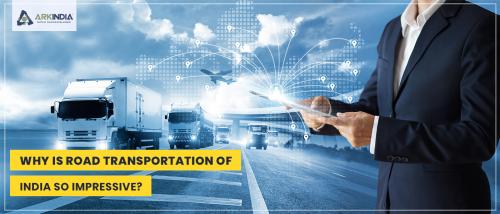
India is a geographically and culturally diverse country. In this land of wonders, we experience all kinds of weather, landscapes, and people! From sunny beaches to snowy mountains, from modern urban cities to orthodox rural towns, we have it all! The roads connect all this diversity together and make India the big proud nation that it is. But that is not what all the roads do! From a practical standpoint, roads are also responsible for great economic growth since it facilitates transporting cargo, personnel, and goods. The interconnectivity of roads in India is second to none, making the operation of supply chains very smooth and cost-effective.
Compared to other modes of transportation for logistics, road connectivity offers the most cost-effective option. From a company’s viewpoint, road transport requires lesser investment than railways, air, or maritime alternatives. There are additional costs linked to all the various kinds of transportation like maintenance, development of structure, staff, and other operating costs, which are also cheaper in road transportation.
Another big advantage is the level of connectivity to small and lesser connected points like small towns, which don’t necessarily always have railway stations or airports. This wide connectivity is also what helps in the development of a country and its economy.
There are many other advantages associated with road transport, like its speed and flexibility. It is a preferred means of transportation for shorter distances and also provides the comfort of door-to-door delivery. It provides an economical option for loading and unloading as well. You can get away with small budgets and still fulfill the tasks efficiently. So what role and advantages are offered by road transportation to a country’s economic development?
Economic Development of India through Road Transportation
Any developing country relies on its capabilities of trade and commerce development for growth. Simultaneously, trade and commerce, whether local or international, depending on logistics, supply chain, and means of transportation for growth. So transportation infrastructure and practices become an important driving force in shaping a country’s economy.
In India, road transportation forms the chain link between production and consumption. It controls the country’s economy in a major way. India has grown rapidly in terms of development, and the development of major transportation systems is one of the biggest reasons. The development of air, shipping, railways, and especially road transportation services has been vital for the country’s rapid economic growth. This growth has increased productivity and jobs for the people and profits for the businesses involved.
India’s transport industry has become a self-evolving machine that constantly upgrades and gets better. A shift to a customer-centric and energy-efficient approach has been fruitful and resulted in a booming economy. There is no question that it is built on the back of a robust road transportation infrastructure. Let’s look at some roles that road transportation plays in India.
1.Connectivity to remote areas is one of the biggest features of road transportation in India. Villages, backwaters, and other disconnected areas consist of a bulk of the mega-population that India hosts.
2.Road travel complements other important means, such as railways, and provides “the last mile” delivery options. This makes up the linking piece between the customer’s door and the transportation hubs like railway stations and airports.
3.Road transportation in India is capable enough of connecting cities in both shorter and longer distances within each other. Door-to-door long-distance connectivity is possible for this very reason.
4.Agriculture is another major industry in India, and road transportation is preferred for perishable agricultural produce because of the connectivity to rural areas and doorstep connectivity.
5.Because of the potential influence of the roadways, defense and national security systems can use the roadways for outreach.
Road transportation sure seems like a very lucrative way to take care of business needs. But there are some disadvantages, and areas of development that need to be looked at when it comes to road transportation. Let’s look at some cons.
1.Accidents are the most likely to happen on roads when compared to other modes of transportation. It is responsible for a significant amount of deaths and damage to cargo.
2.There is a good percentage of roads that are inadequately built and are in bad shape. On top of that, the ones that are well built initially can sometimes be poorly maintained, causing long-term problems on the route. Less than 0.1% of the income is spent on the maintenance of roads.
3.Rising fuel costs is one thing that is a major concern for road travel. Every year the rates are climbing up just slightly more.
4.Road transportation is convenient and cost-efficient, but only if you are dealing with rather short distances. Road travel can seldom happen over really long distances.
Regardless of these cons, road travel still remains one of the most efficient methods to move cargo in India. Especially given the diverse and dense country that we are, road transportation is a good linking mechanism to make us more connected. Any business in India that relies on meticulous supply chain operations needs a robust road transportation strategy.
If your business is looking for help with supply chain strategies and operations, partnering with a third-party logistics provider such as ARK India is in your best interest. We bring years of industry experience, coupled with the latest and most advanced resources, to help you reach your customers efficiently and increase your profits!.